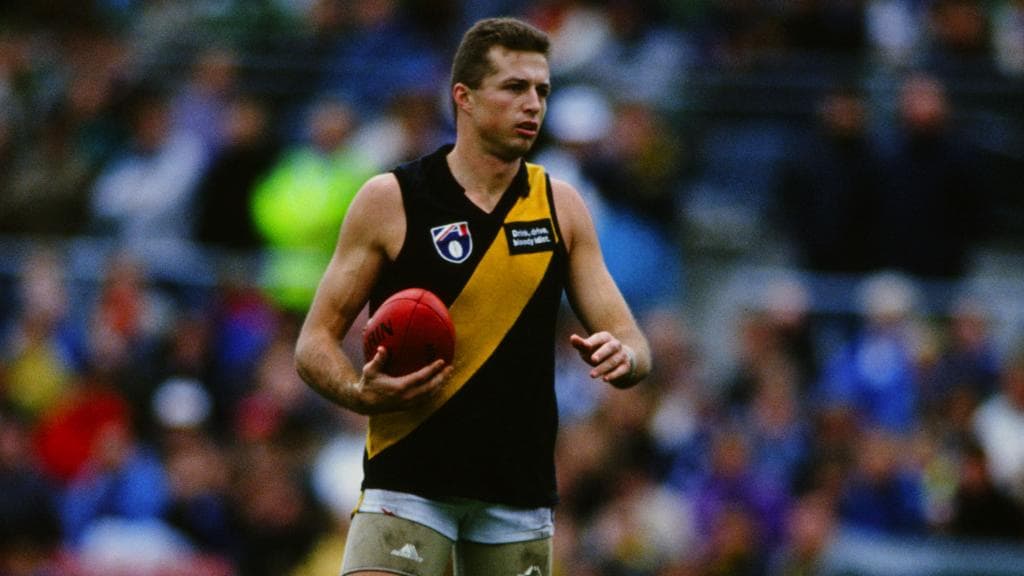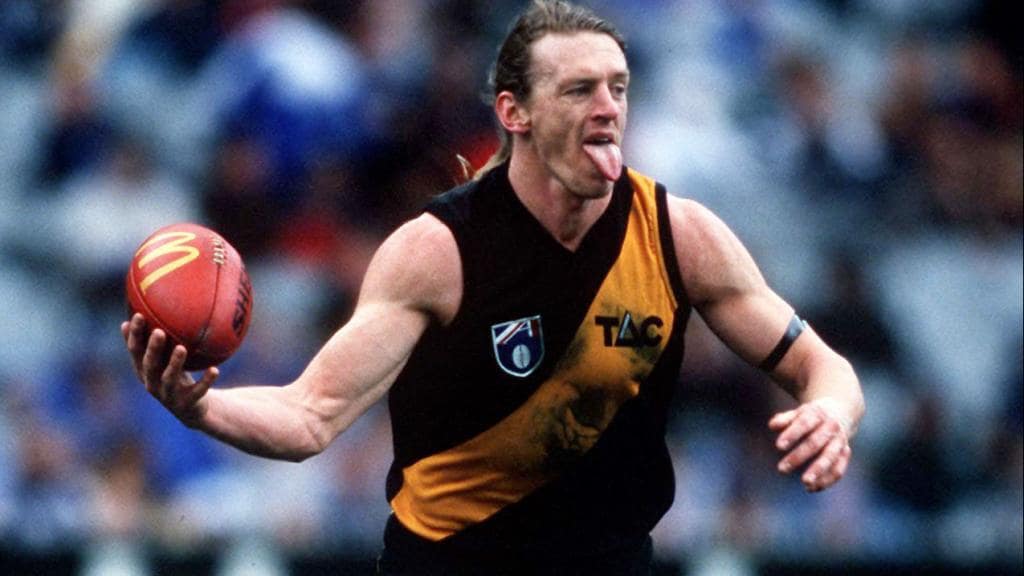It’s 25 years since Richmond pulled off one of the most sensational trade deals in league football history.
In October 1993, the Tigers traded their captain Jeff Hogg to Fitzroy in exchange for three Lions players – Paul Broderick, Michael Gale and Matthew Dundas.
Richmond had finished second-last (14th) in the ’93 season, with just four wins under coach John Northey, who had taken the coaching reins at his old club that year following a successful stint in charge at Melbourne. Fitzroy, under Robert Shaw, had finished 11th in ’93, with 10 wins.
Hogg had been a rare shining light during a particularly bleak time for the Tigers. He’d won the Club’s Leading Goalkicker award in five of the previous six years and had also been put to good use plugging holes up the other end of the ground, in a leaky defence.
But 1993 saw a new kid arrive on the block for the Tigers . . . a raw, gangly, exciting teenager from Tasmania by the name of Matthew Richardson.
Young ‘Richo’, the son of Richmond’s 1967 premiership ruck-rover ‘Bull’ Richardson, had stamped himself as a young forward with enormous potential, booting 31 goals in 14 games in his debut season.
Over at Fitzroy, Alastair Lynch had emerged as a key forward of note, finishing the ’93 season with 68 goals and winning the Lions’ Best and Fairest award. Lynch’s excellent performance that year had attracted the attention of the fledgling, struggling Brisbane Bears, who were hell-bent on enticing a marquee player to their club.
Brisbane pounced on Lynch, offering him an unprecedented 10-year contract, reportedly worth $1 million (a massive deal back then).
Lynch’s acceptance of the lucrative offer from the Bears paved the way for the Hogg-Broderick, Gale and Dundas mega-trade deal to happen.
Fitzroy felt the 26-year-old Hogg, who had taken over the Tigers’ captaincy in 1993, was an ideal replacement for Lynch.

Meanwhile, back in the Lions’ den, gun midfielder Paul Broderick was looking for a change of football scenery, following a distinguished six-season 93-game career at the club.
“When Alistair Lynch left to join Brisbane, I just felt Fitzroy had lost its figurehead and most marketable asset, and that the writing was on the wall for the club,” Broderick said.
“Basically, I wanted to stay in Victoria and Richmond, with the connection I had with them as a junior, was my preferred option.
“I loved the Tigers as a kid, grew up barracking for them, and they got wind I wanted out at Fitzroy.
“Occasionally, during my time with Fitzroy, they’d enquired about my availability, and now they were trying to get me across.
“Francis Bourke even came around to my house one night and said the Club really wanted me to join them. And, when someone of Francis’ calibre goes out of his way to do that, it’s pretty impressive.
“So, it all just evolved from there.
“It was actually meant to be myself and (clever Richmond on-baller) Craig Lambert as a straight swap, with ‘Hoggy’ to be swapped for Michael Gale and Matthew Dundas.
“But, at the 11th hour, ‘Lamby’ pulled the pin and sent everything into chaos (Lambert subsequently quit Richmond and joined Brisbane).
“From what I understood, Richmond pulled in all the heavies – Mal Brown, etc., and fronted Fitzroy and told them where to go . . . “We’ve got his signature, he’s coming, he’s a Tiger now”.
“Fitzroy wilted and sent the three of us across for Hoggy, and that was the end deal. But they really could have called my bluff and kept me . . .”
If the John Pitura trade (swapped by South Melbourne to Richmond for Tigers trio Brian Roberts, Francis Jackson and Graham Teasdale) a couple of decades earlier had been a low-point for the Tigers, this move paid off magnificently, despite initial protests from some members of the Yellow and Black faith, who were so incensed, they sent their No. 34 (Hogg’s number) jumpers into the Club.
In 1996, Broderick won the coveted Jack Dyer Medal. He contributed superbly until his retirement at the end of 2001, averaging more than 20 games a season (169 in total) during his eight-year stint with the Tigers.
Gale, who joined his younger brother Brendon at Punt Road, following a 105-game career at Fitzroy, provided Richmond with first-rate service over 91 games, while Dundas lasted just two seasons and 14 games.
For Hogg, however, it was a vastly different story . . . A back problem, which had restricted him at Richmond, failed to improve, and he managed just 40 games and 41 goals until he – and, indeed, Fitzroy – bowed out of the competition after the 1996 season.




